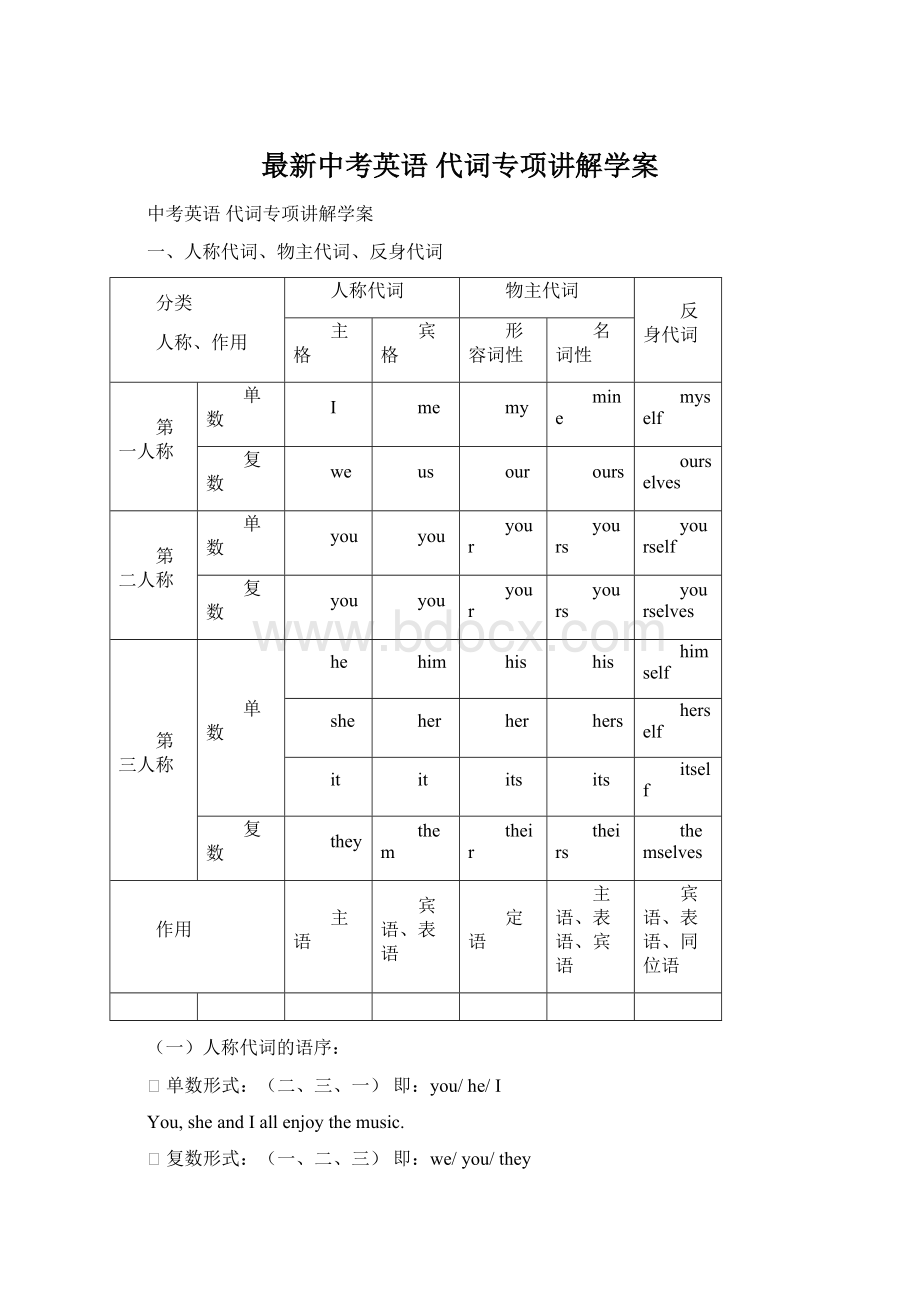最新中考英语代词专项讲解学案.docx
《最新中考英语代词专项讲解学案.docx》由会员分享,可在线阅读,更多相关《最新中考英语代词专项讲解学案.docx(27页珍藏版)》请在冰豆网上搜索。

最新中考英语代词专项讲解学案
中考英语代词专项讲解学案
一、人称代词、物主代词、反身代词
分类
人称、作用
人称代词
物主代词
反身代词
主格
宾格
形容词性
名词性
第一人称
单数
I
me
my
mine
myself
复数
we
us
our
ours
ourselves
第二人称
单数
you
you
your
yours
yourself
复数
you
you
your
yours
yourselves
第三人称
单数
he
him
his
his
himself
she
her
her
hers
herself
it
it
its
its
itself
复数
they
them
their
theirs
themselves
作用
主语
宾语、表语
定语
主语、表语、宾语
宾语、表语、同位语
(一)人称代词的语序:
v单数形式:
(二、三、一)即:
you/he/I
You,sheandIallenjoythemusic.
v复数形式:
(一、二、三)即:
we/you/they
(二)、名词性物主代词和形容词性物主代词
v形容词性物主代词在句中做定语修饰名词,一般不单独使用。
v名词性物主代词常用来避免与前面提及的名词重复,相当于“形容词性物主代词+名词”。
v注意:
名词性物主代词在句中所指代的关系是单数还是复数。
Thesebooksaren'tours.Oursarenew.(ourbooks=ours)
Thisisnotourroom.Oursisoverthere.(ourroom=ours)
v“of+名词性物主代词”表示所属
Asisterofhisisanurse.
Tomisafriendofmine.
1.Sheisafriendof________.
A.myB.mineC.I
2.Thisisn’tmypen,itis_____.
A.herB.hisC.him
3.Frankcan’tfind____dictionary.Canyoulend____to_____?
A.her,mine,her
B./,yours,he
C.his,yours,him
(三)、it的用法
vit既是宾格又可以做主格,有时也可以指人。
v1.代表前面提到过的事物。
如:
Mypenismissing.Ican’tfinditanywhere.
v2.用来指人,主要指婴儿或者身份不明的人。
-----Whoisknockingatthedoor?
-----Itisme.
Thewomanhadababy.Itwasfivemonthsold.
v3.表示时间、距离、天气等。
如:
Itwillbesunnytomorrow.
v4.作形式主语或者形式宾语。
如:
IfounditdifficulttolearnEnglishwellfirst.
Itisimpossibleforustolearnaforeignlanguage.
※※※it固定句型
1.做某事情对某人来说是…Itis+adj.(+forsb.)+todosth.
Itishardformetodothiswork.
2.轮到某人做…It’sone’sturntodosth.
It’syourturntocleantheroom.
3.是(某人)做某事的时候了It’stime(forsb.)todosth.
It’stimeforyoutodothehomework.
4.据说…It’ssaidthat…
It’ssaidthatyourteacherleaveourschool.
5.某人花费…做某事Ittakessb.sometimetodosth.
6.自从…以来,已经有…(时间)了。
Itis/hasbeen+时段+since+从句(过去时)
7.某人发现/认为/感觉到做某事是…的
find
sb.think+it+adj.todo
feel
练一练:
1.Ifound___verydifficulttomakeprogressinmystudy.
A.it’sB.itC.that
2.It__myfatherawholemonthtogoonbusiness.
A.spentB.costC.took
3.Itisgreatfun__surfingontheInternet.
A.goB.togoC.going
(四)、反身代词的用法
v定义:
反身代词又称自身代词,由第一人称、第二人称形容词性物主代词和第三人称人称代词宾格,单数加词尾self、复数加词尾selves构成,可用口诀简记如下:
v反身代词表自身,self与selves单复分。
一、二人称形代后,第三人称改用宾。
1.作动词的宾语
反身代词可以与enjoy,hurt,teach,lookafter等词连用,表明动作的承受者就是主语本身。
1)enjoyoneself=haveagoodtime
Didyouenjoyyourselfatthepartylastnight?
2)helponeself(tosth.)随便吃点什么,后面可接食物,一般用在宴会当中,用来招呼客人的用语。
Helpyourselvestosomefruit,children.
3)hurtoneself伤着自己Shedidn’thurtherself.
4)teachoneself=learnbyoneself自学
DidyouteachyourselfEnglish?
=DidyoulearnEnglishbyyourself?
5)lookafteroneself照顾自己
Icanlookaftermyselfwell,thanks.
6)saytooneself自言自语
Marysaidtoherself,“WhatshallIdo?
”
7)cometooneself苏醒
Soontheladycametoherself.
8)makeoneself+过去分词,使自己被别人…
Shedidherbesttomakeherselfunderstood.
9)makeyourselfathome别客气,让自己像在家一样
Helpyourselftosomefish.Makeyourselfathome.
10)loseoneselfin沉浸于……陶醉于……
Theybothlostthemselvesinthebeautifulmusic.
2.反身代词和介词连用构成介词宾语
1)byoneself=alone自己做
Shehasdoneherhomeworkbyherself.
2)foroneself为自己
Shemadetheskirtforherself.
3)ofoneself自然而然的、自动的
Thedooropenedofitself.
4)amongthemselves在他们中间
Theyarediscussingthematteramongthemselves.
3.作表语
反身代词可与be动词或系动词连用,表示或描述一种感觉、情绪或状态。
Thelittleboywasmyself.
4.用作主语或宾语的同位语,往往用来加强名词或代词的语气,在句中可置于名词、代词之前、之后或句子末尾。
1)作主语的同位语
Youwillhavetodoityourself.
Hehimselfwrotethewordsandmusicofthesongs.
2)作宾语的同位语
Iwillgivethelettertoyourbrotherhimself.
You’dbetteraskMaryherselfaboutit.
练一练:
1.Themanisrich,hecanbuy___alotofthings.
A.heB.hisC.himself
2.---Whatalovelycard!
Wheredidyoubuyit?
---Imadeitby_____.
A.meB.myselfC.itself
3.“Help____tosomechicken,”mymothersaidtotheguests.
A.yourselfB.yourselvesC.your
二、指示代词this/that/these/those
单数
复数
用法1
用法2
this
these
近指
指下文将要提及的事
that
those
远指
指前面刚提过的事
指示代词(this,that,these,those)在句中可作主语、宾语、表语、定语:
Thisisyoursandthatismine.
Iliketheseandhelikesthose.
Thesecomputersarecheap.
WhatIwanttosayisthis.
【说明】指示代词用作主语和定语时,可指人或物;用作宾语和表语时,只指物。
如Thisismyfather.this在句中作作主语,可以指人,
但是在Doyouknowthis?
中,this作宾语,此句只能理解为“你知道这个情况吗?
”不能理解为“你认识这个人吗?
”
vthis与that用法比较
1.用来回指上文提到的事情时,可用this或that,但是若要指下文叙述的事情,通常要用this:
ShemarriedJim,andthis[that]surprisedme.
Iwanttoknowthis:
Ishehealthy?
2.在打电话时,通常用this指自己,用that指对方:
Hello.ThisisJim.IsthatJohn?
v表替代的that与those
有时为了避免重复,可用that和those代替前面提到的名词:
ThepopulationofChinaismuchlargerthatthatofJapan.
HisviewsareclosetothoseoftheSocialistParty.
vThat和those可作定语从句的先行词,但this和these不能,同时,在作先行词时,只有those可指人
试比较:
Headmiredthatwhichlookedbeautiful.他赞赏外表漂亮的东西。
Headmiredthosewholookedbeautiful.他赞赏那些外表漂亮的人。
(those指人)
Headmiredthosewhichlookedbeautiful.他赞赏那些外表漂亮的东西。
(those指物)
练一练:
1.ThepopulationofShanghaiislargerthan__ofJinan.
A.thatB.thisC.it
2.TheradiosmadeinBeijingareasgoodas___madeinQingdao.
A.thatB.theseC.those
3.WhatIwanttotellyouis___thefilmwillbeateight.
A.itB.thisC.that
v【辨析】one,it,that
it常用来特指上下文提到的同一事物,用来指可数名词或者不可数名词,one泛指上下文提及的同类事物中的一份子,用于代替可数名词,that常用在比较等级中,代表前面提到的名词,以避免重复。
Thebookismine.Itisveryinteresting.
Ihavesomeapples.Youcanhaveone.
TheweatherofDalianismuchwetterthanthatofLanzhou.
one同类不同件.it同类同件.
1.Theboxisinthemiddleoftheroom.Move__away.
A.itB.oneC./
2.Ihavelostmypen.Ihavetobuy___.
A.oneB.itC./
3.Howniceyourbagis!
Iwanttobuy___.
A.itB.oneC./
三、不定代词
(一)some和any
1.some用于肯定句中,但若是表示请求、建议或希望得到肯定回答时也可用于疑问句中
2.any用于否定、疑问和条件句中(若用于肯定句中则表示“任何”的意思)
Eg1.Wouldyoupleasepassmesomesauce?
2.HespeaksEnglishbetterthananyotherstudent.
3.Ifyouhaveanyquestions,pleaseletmeknow.
练一练
用some或any填词:
1.Wouldyoulike______coffe?
2.Doyouhave______moneywithyou?
中译英:
1.任何学生都会做这个题目。
2.如果你有困难,我会帮助你的。
(二)many和much
vmany意思是“很多”,与可数名词复数连用;much意思是“很多”,与不可数名词连用。
它们在句中可作主语、宾语和定语等。
如:
Idon’thavemanyfriendshere.(在这里我没有很多的朋友。
)
Manydiedinthebusaccident.(许多人在公交车祸中丧失)
Wecanlearnmuchwiththehelpofhim.(在他的帮助之下我们能学到很多)
名词修饰语一览表
常修饰可数名词的词或短语
常修饰不可数名词的词或短语
既可修饰可数名词又可修饰不可数名词的词或短语
each,every,several,few,afew,many,toomany,anumberof,manya/an,onlyafew,quiteafew…
little,alittle,much,toomuch,agood/greatdealof,abitof,asmall/large/hugeamountof…
some,any,alotof,lotsof,plentyof,enough,alltherestof…
(三)afew,alittle,few,little
表示肯定,“有几个,有点”
表示否定,“没多少,很少”
后加名词
afew
few
可数名词
alittle
little
不可数名词
1.Althoughallthegirlshavetriedtheirbest,only___passtheexam.
A.fewB.afewC.alittle
2.Don’tworry.Thereis____timeleft.
A.littleB.alittleC.few
3.Youaresogreat!
____peopleintheschoolcandoit.
A.AlittleB.LittleC.Few
(四)Each与every都有“每个”的意思
each既可用作形容词,又可用作代词,在句中可以作定语,主语、宾语、同位语、状语等。
例如:
1.Eachstudenthashisowndictionary.(形容词,定语)
2.Eachhashisgoodpoint.(代词,主语)
3.Ourheadteacherhadatalkwitheachofus.(代词,宾语)
4.Thestudentseachhaveadesk.(代词,同位语,不影响谓语动词的单复数)
5.Thechildrencanhaveabageach.(副词,状语)
every却只有形容词词性,不可单独使用。
(五)both/either/neither
1.both“(两者)都”,作主语时看作复数;作定语时后跟名词复数
Myparentsarebothteachers.=Bothofmyparentsareteachers.
2.neither“(两者)都不”,含有否定意义,作主语时谓语用第三人称单数;作定语时后跟名词单数
Neitheranswerisright.
3.either“两者中任何一个”,作主语时谓语用第三人称单数;作定语时后跟名词单数
Therearetreesoneithersideofthestreet.=Therearetreesonbothsidesofthestreet.
※※※有关词组及应用
1.bothof/eitherof/neitherof
Bothofthemswimwell.
EitherofyougoestoBeijing.
Neitherofthemstoppedtohavearest.
eitherof两者之一
+复数名词/them/us
谓单
neitherof两者都不
谓单
bothof两者都
谓复
①___ofthegirls___him.Theyaskedhimfornamecard.
A.Neither;know
B.Either;know
C.Neither;knows
②Bothofhisparents___teachers.
A.isB.areC.was
③Bothofhisbrothers___inthishospital,butneitherofthem___adoctor.
A.works;isB.work;isC.work;are
2.both…and(谓语动词用复数形式)BothTomandLucyareinGradeTwo.
3.either…or/neither…nor(谓语动词遵循就近原则)
Eithermyfatherormymothercooksathome.
NeitherhenorIamfreetoday.
either…or…或者…或者…
就近原则
neither…nor…两者都不
both…and…两者都
复数谓语
练一练:
1)EitherTomorthetwins__thewaytotheshop.
A.knowB.knowsC.finds
2)NeitheryounorI___ascientist.
A.isB.areC.am
3)BothTomandMary___hard.
A.studiesB.studyC.studying
4)ThestudentsareallfromFoshan.They___liketheircity.
A.bothB.allC.either
5)LucyandLily___agreewithus.
A.allB.bothC.neither
6)Howareyourparents?
Theyare____fine.
A.bothB.allC.no
(六)all/none
1.all“(全部)都”,表示三者或三者以上,作同位语时,一般放在连系动词、助动词之后,行为动词之前
WeareallfromCanada.
TheyalllikeEnglish.
2.none“没有”,表示三者或三者以上都不,后常跟介词of(谓语动词单、复数均可)none能独立使用,在句子中可作主语、宾语和表语,意思是“没有一个人(或事物)”,表示复数或单数。
如:
Noneofthemis/areintheclassroom.(他们当中没有一个在教室里)
Noneofusis/areafraidofdogs.
Ihavemanybooks,butnoneisinteresting.
3.all和both用于否定时表示部分否定。
Allflowersinhisgardenarenotred.他花园里的花并非都是红色的。
Both(ofthem)arenotmybrothers.他们两个之中,只有一个是我的兄弟。
另外,表示部分否定的词还有every(everyone)。
Everymancannotbeapoet.并非人人都可以成为诗人。
Bothofmyparentsareteachers.(改为否定句)
____ofmyparents_____ateacher.
另外,需要注意的是:
回答howmany引起的特殊疑问句时要用none;回答who引起的特殊疑问句时要用noone。
例如: